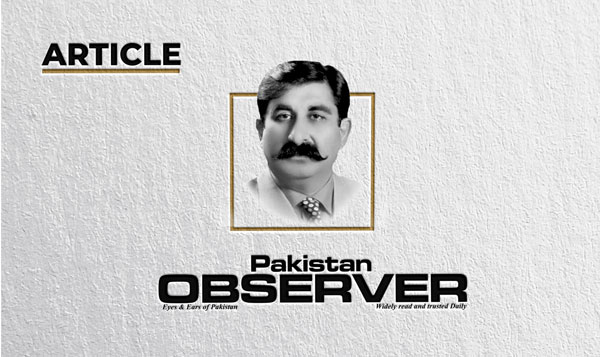Gen Asim Munir & challenges
IDEALLY, military chief should get retire after the completion of his tenure but in Pakistan often this has not been the case.
The military chief General Asim Munir must realize that Pakistan has only seen four military chiefs in the last 24 years.
This is four less army chiefs that could have commanded the army ie if all army chiefs had retired after their regular service tenure of three years.
General Asim Munir like all military chiefs, will be in the service of the government of the day.
But when it comes to extending and furthering the interests of the military as an institution it is hoped that the new military chief will consider and further the interests of the state and not the interests of any government because those interests may be only politically motivated and it is not the business of the military to indulge in politics.
General Asim will face multiple daunting challenges which his forerunners also have to confront.
As General Qamar Javed Bajwa has reached the culmination of his prolonged tenure as Pakistan’s Chief of Army Staff, it is vital to analyze the trials that Pakistan’s next military chief General Asim Munir must tackle.
Army Chief is to adopt a firm stance in securing Pakistan’s borders as the South Asian theatre is more volatile than ever before.
The chief must mitigate battle risks with nuclear-powered competitor India along its eastern border.
This means exhibiting a muscular posture towards India’s hawkish BJP ultra-nationalist government.
The army chief and his team will have to secure the Line of Control in a highly restive Kashmir as well as dealing with an increasingly belligerent Taliban regime which is removing the barbed-wire fence straddling the Durand Line the border between Pakistan and Afghanistan along the western border.
In counter-terrorism the new chief will have to double down on intelligence-based operations and initiatives like operation Radd-ul-Fasaad to clear tribal belt of militant sanctuaries, especially to counter a dangerously resurgent Tehrik-e-Taliban Pakistan a US-designated terrorist group whose sleeper cells have awakened and are conducting terror in Pakistan by infiltrating through Afghanistan’s border.
Eliminating TTP cells will be a foremost challenge for the army chief. Restoring domestic security and quelling insurgencies in the Pashtun and Balochistan regions presents another challenging front.
The new army chief will play a pivotal role whether Pakistan pivots its foreign policy closer to either China or the US in the Great Power contest between America and China that will define international relations over the coming years.
The US President Biden has recently stated that “Pakistan is one of the most dangerous nations in the world” since the country has “nuclear weapons without any cohesion”.
This will require urgent damage control. Here, Pakistan’s military chief will remain steadfast, keep encouraging transparent IAEA inspections and reassure the global community over the robust safeguards surrounding Pakistan’s nuclear command and control systems in a turbulent nuclear conflict-ridden South Asia.
The next challenge is rectifying a reputational crisis brought about in the wake of Imran Khan’s ouster from power through what, he alleges, was an engineered vote of no-confidence.
The new army chief must focus on the military’s reputation through genuine national consensus building and stakeholder inclusion, including strengthening strayed civil-military relations.
Healing the civil-military divide is not an easy feat. Such reputational repair requires a multi-pronged stratagem from stealth PR campaigns to long-term social reintegration and succor of Pakistan’s 35 million flood victims which is to a large extent undertaken by Pakistan’s military.
Pakistan is beset by political polarization, disunity and economic malaise. The domestic discontent has created uncertainty in the country.
Army officials are selected from a similar demographic of Imran Khan’s support base. Assertions to curtail political intervention by the military must be substantiated with solid evidence.
Imran Khan’s not returning to Parliament may disappoint the military cadres, requiring the senior most military corps to bridge such internal dissonance.
The new COAS must delicately balance the wishes of his own officers with a veritable exit of the army from politics and assure ‘neutrality’ much easier said than done.
In the light of the lacklustre performance of certain elected representatives, any COAS can feel the urge and compulsion to carry on encroaching into the political arena.
How the new COAS circumvents this and exercises strict restraint from forays into government politics will meaningfully repair civil-military relations and course-correct Pakistan toward financial, diplomatic, political and economic stability.
General Bajwa tremendously widened his job responsibilities and those of the military. When Saudi Arabia, the US, China or the EU need something, their de facto port of call is the COAS.
This was a perennial challenge. To genuinely extricate itself from day-to-day politics the new COAS must avoid dejecting Pakistan’s elected representatives.
General Asim Munir, the military supremo like all the rest, will be in service of the incumbent government.
It is paramount that the new Army Chief will prioritize the interests of the state and not those of the government as those interests are politically charged and must no longer be the business of the army to politically interfere.
Premier Shehbaz Sharif has graced the most senior and upright General Asim Munir as COAS and General Sahir Shamshad as Joint Chiefs of Staff Committee; that way none can blame him for partisanship and favouritism.
With great power comes great responsibility. For better and safer future of the country and the nation the military and judicial institutions will have to keep themselves away from political matters and justify the neutrality.
—The writer is editor, book ambassador political analyst and author of several books based in Islamabad.










